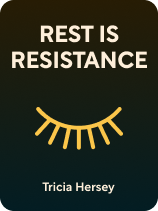

This article is an excerpt from the Shortform book guide to "Rest Is Resistance" by Tricia Hersey. Shortform has the world's best summaries and analyses of books you should be reading.
Like this article? Sign up for a free trial here.
Is rest something you can truly master? How can you find genuine relaxation in a world that seems to never stop?
Rest is more than just taking a break from work. It’s a deliberate process that addresses your physical, emotional, and spiritual needs. In Rest Is Resistance, Tricia Hersey explores how to practice authentic, restorative rest and envisions a community that values well-being over productivity.
Continue reading to learn how to rest effectively with some practical tips on incorporating rest into your life.
How to Rest
Hersey says that even attempting to rest has become a battle, largely because our culture lacks authentic models for how to rest. Rest is a slow, deliberate process that must address your physical, emotional, and spiritual needs.
In contrast, many popular and trendy “resting” practices are still rooted in harmful capitalist ideology. These practices offer quick fixes with the aim of rejuvenating workers just enough to get them back to work. For instance, it’s fairly common for large companies to offer employee “retreats,” where their workers can spend a day or a weekend enjoying themselves at the employer’s expense. However, not only does this misconstrue rest as something short-term that’s only done on special occasions, it’s also not done out of genuine concern for the employees’ well-being. Instead, such retreats are just another tactic to boost productivity.
(Shortform note: While it’s true that many companies encourage rest out of concern for their bottom line, rather than genuine concern for their workers’ well-being, this is one instance where personal needs and corporate interests can align with each other. Many employers, including well-known companies like Nike and Procter & Gamble, have realized that well-rested workers are more productive (and therefore more profitable) than tired ones. As a result, these companies have introduced rest-supporting measures like flexible work schedules and dedicated quiet rooms where employees can nap or meditate.)
We’ll review some of Hersey’s suggestions for how to practice genuine, restorative rest. We’ll then conclude with Hersey’s vision of a community that values well-being over productivity—a place where people come together in a collective mission to reject grind culture, ensuring that everyone gets the rest they need and deserve.
Rest Practices
If there are no cultural models for rest, then how can you learn to rest effectively? Hersey gives a number of suggestions for disconnecting from grind culture and creating space for yourself to begin healing.
Believe that you deserve to rest: Hersey says that true, restorative rest begins with a shift in mindset. You must believe that you truly and inherently deserve rest, with no need to “earn” it. This is because, if you spend your rest time feeling guilty or worrying about all the things you’re not doing, you will not rest effectively.
Snatch rest whenever you can: In our busy lives, it’s crucial to seize moments of rest whenever they present themselves. Whether it’s a few minutes between tasks or an unexpected lull in your schedule, take advantage of these opportunities to recharge and rejuvenate however you can, whether that means taking a quick nap or just taking a moment to sit and breathe.
(Shortform note: To illustrate this point with an example, few people are as busy (or as tired) as the parents of a newborn. Therefore, “sleep when the baby sleeps” is common advice for new parents—advice that they often find hard to follow because of all the chores and other responsibilities they feel the need to spend that time doing. However, health experts agree with Hersey that your own well-being comes first, and resting when you’re tired is more important than whatever noncritical tasks you were hoping to do during those rare moments of downtime.)
Indulge in daydreams: Hersey promotes daydreaming as a form of rest that can be accessed at any time, calling it a “mini-nap.” Even when you’re physically stuck at work, you can restore a bit of your strength by imagining yourself in a more pleasant situation, or motivate yourself by envisioning a more equitable and loving society.
(Shortform note: Research supports the idea that daydreaming benefits your well-being. Studies have found that indulging in daydreams can reduce stress, while at the same time boosting creativity and problem-solving skills.)
Create a nice environment: Design a restful space that appeals to your senses and promotes relaxation. Incorporate soft surfaces, ensure you feel safe and secure, minimize noise, engage in gentle stretching, and consider using calming scents like essential oils to create a soothing atmosphere.
Detox from social media: Take regular breaks from the constant stream of information and stimulation provided by social media platforms. This digital detox can help reduce stress, improve focus, and allow you to be more present in your surroundings and relationships.
(Shortform note: A social media detox can be harder than it sounds. As Adam Alter explains in Irresistible, social media (along with many other products like smartphones and video games) is literally designed to keep people hooked, often at the cost of their mental and social well-being. Alter therefore recommends taking reasonable steps to reduce technology’s presence in your life, such as removing social media from your phone so you’re not tempted to constantly check it.)
Practice spirituality: Spirituality (whether religious or secular) provides a framework for understanding our place in the world, which can offer comfort, a sense of purpose, and resilience in the face of life’s challenges. Therefore, Hersey recommends doing things that bolster your sense of belonging, self-worth, and control over your life. For example, practicing spirituality could mean attending religious services or meditating at home.
(Shortform note: What exactly is our place in the grand scheme of things? In Astrophysics for People in a Hurry, astrophysicist Neil deGrasse Tyson says that humans are an almost-immeasurably small and unimportant part of the universe. While some people may find that depressing, Tyson sees it as a much-needed reality check: From the perspective of astrophysics, all of the differences and problems we humans think we have become trivial. He therefore argues that understanding just how insignificant we are creates an opportunity to set aside our egos, recognize that our world is much bigger and more important than any one of us, and come together for the good of all.)
Hersey concludes by saying that different people may need to find rest in different ways, and that only you can determine what works best for you. Therefore, resting should be a daily practice, as well as a lifelong process of learning what makes you feel better—what you can do to best meet your own unique needs.
| The Role of Rest in Recovering From Trauma Hersey’s assertion that rest must involve physical, emotional, and spiritual healing practices closely mirrors how psychotherapist Pete Walker describes the process of recovering from Complex Post-Traumatic Stress Disorder (CPTSD). This suggests that the harm Hersey attributes to grind culture may, in fact, be a form of CPTSD. In Complex PTSD, Walker explains that CPTSD is a disorder resulting from repeated traumatic experiences; for instance, it’s common among people who grow up in abusive households. He also says that, since these repeated traumas impact the survivor in many different ways, there are also many different aspects to recovery, including: Mental recovery: Complex trauma survivors often internalize the hurtful messages that they hear over and over, such as that they’re stupid, helpless, or unlovable. Much like recovering from grind culture must involve rediscovering a sense of self-worth that isn’t connected to work, recovering from CPTSD involves helping the survivor to develop self-esteem and self-love. Physical recovery: People who experience repeated physical abuse often have chronic injuries, or they suffer from old injuries that weren’t treated properly, such as broken bones that were never professionally set. Therefore, recovering from CPTSD must include healing the survivor’s body as much as possible—which is also one of the major benefits of rest that Hersey describes. Emotional recovery: Complex trauma survivors often repress their emotions in order to cope with abuse, or because their abusers punish them for expressing their feelings. Recovering from CPTSD involves reconnecting with those emotions, which mirrors how rest helps you to reconnect with yourself as a human being, instead of as a productive machine. Social recovery: Finally, people with complex trauma often struggle to form healthy relationships because their experiences have taught them that people are dangerous and untrustworthy. Therefore, healing from CPTSD must involve learning how to accept love and support from others, and offer love and support in return. As we’ll discuss shortly, community—working together and supporting one another—is also a crucial part of Hersey’s anti-grind ideology. |
Tip: Real Rest Is Accessible
Although rest may look different for different people, Hersey says that all forms of true rest have some things in common.
First, rest doesn’t cost money. This is because true rest is inherent to us as people, not something that society or culture has to give to us. Therefore, much like you don’t need to pay money to breathe, you don’t need to pay money to rest. For example, while an expensive spa package might be very relaxing, it’s not necessary for rest.
Second, rest doesn’t require travel. There’s no need to go somewhere special in order to rest. For instance, you don’t have to go on a vacation or a special retreat in order to relax and heal from life’s stresses.
(Shortform note: Although rest looks different for every person, in his book Focus, psychologist Daniel Goleman provides another helpful guideline: Activities where you can passively take in what’s happening will help to restore your mental energy. For instance, watching a movie, reading a book, or taking a walk—all of which can be done freely and locally, as Hersey says—have this type of restorative effect. Conversely, activities that force you to concentrate, analyze information, and make decisions further drain your mental energy. For example, an intense strategic game like Crusader Kings might be enjoyable, but it’s not likely to give your brain the rest it needs after a long day of work.)
Finally, rest is universal. Every person, regardless of their age, sex, health, job, and so on, has the innate ability to rest. Therefore, rest isn’t something that must be taught by an outside expert, although it may take time and practice to discover what forms of rest work for you.
(Shortform note: Hersey is far from the only person who believes that everyone can rest and should have ample opportunity to do so. In fact, the United Nations (UN) has declared that rest is a human right, thereby placing it on par with ideals like liberty (the right not to be enslaved) and protection from torture. Article 24 of the UN’s Universal Declaration of Human Rights states, “Everyone has the right to rest and leisure, including reasonable limitation of working hours and periodic holidays with pay.”)
Exercise
Think about how you’d benefit from making rest more of a priority in your life and how you might do that.
- What’s one practice that you’d like to incorporate into your own life?
- How could you incorporate that practice into your schedule? For example, suppose you want to make a resting space for yourself: One approach would be to envision what that space will look like, plan out where and how you’ll create it, and then put that plan into action on your next day off.

———End of Preview———
Like what you just read? Read the rest of the world's best book summary and analysis of Tricia Hersey's "Rest Is Resistance" at Shortform.
Here's what you'll find in our full Rest Is Resistance summary:
- How modern grind culture hurts you physically and spiritually
- The 3 myths that grind culture instill in society
- How rest can be used as a radical form of resistance






